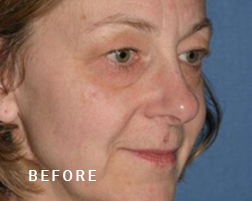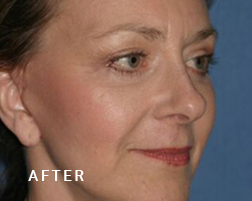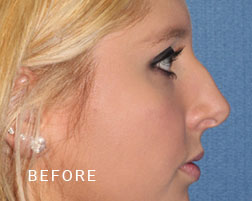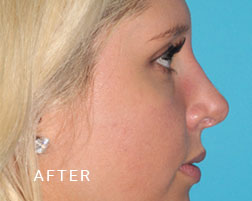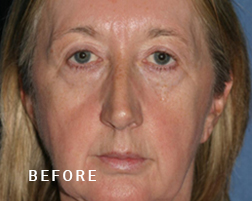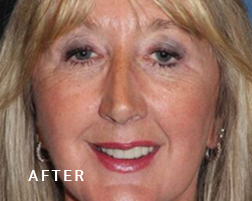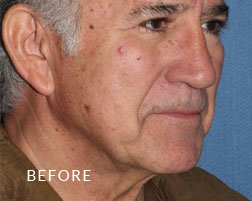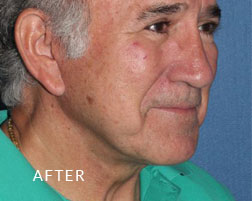Breast Implant Associated Problems
Offered at our convenient location in Scottsdale, Arizona
Breast implants are a popular way for women to achieve their ideal breast size and shape. Cosmetic breast augmentations with implants have an excellent safety record, however, in rare cases, some patients develop potentially serious medical conditions following this type of surgery. The body can react in unexpected ways to the presence of foreign bodies in its tissues. This can present as a cluster of symptoms broadly recognized as “breast implant illness” (BII), or other conditions like capsular contracture, and breast implant-associated anaplastic large cell lymphoma (BIA-ALCL), a non-Hodgkins cancer of the immune system. Breast ailments such as these, while infrequent, can occur. So, patients who undergo cosmetic surgery to alter their appearance should be aware of not only the risks, but also the steps one must take to address these conditions, should they arise.
Andrew Wolin M.D. is a double-boarded plastic surgeon who provides comprehensive breast services for patients with aesthetic and medical concerns. As well as performing cosmetic breast augmentations, he also helps patients with complications that have arisen from prior surgeries. You can book a personal consultation at our Scottsdale office to address health issues that have developed after breast augmentation surgery, or if your breast implants are causing you discomfort and concern. Contact us by calling (480) 945-8440 or filling out an online inquiry form for further details.
Contents
Breast Health
Breast health, and the medical care associated with it, are of paramount importance to women of all ages. But for those who have had a breast augmentation or breast reconstruction with implants following mastectomy, there are some additional factors to consider, namely the effects that their implants could have on their overall health. The risks of any cosmetic procedure are laid out by physicians in the earliest stages of a patient treatment plan. However, if health issues do arise, it can induce a level of uncertainty and concern. Addressing these issues promptly by seeking advice from an expert in the field can be the first step towards recovery and renewed wellness.
Capsular Contracture
Over time, scar tissue forms around the implant creating what is known as a capsule. This is caused by the body’s natural barrier response to foreign material. Capsular contracture occurs when the scar tissue tightens around the implant and becomes abnormally thickened and hard. This type of post-breast augmentation complication is the most common in implant-based breast surgery. It is also one of the most common reasons patients request reoperation.(1) The resulting effects can be:
- Implant rippling and asymmetry
- Breasts that sit too high on the chest
- Unnatural looking breasts
- Overly rounded, firm and tight-feeling breasts
- Pain or discomfort
- Difficulty lying on the stomach
The severity of capsular contracture is measured clinically using the Baker Scale. There are four grades:
- Grade I: Breasts look soft and natural.
- Grade II: Breasts look normal but feel firm.
- Grade III: Your breasts look abnormal and feel firm.
- Grade IV: Your breasts are hard, look abnormal, and feel painful.
Capsulectomy Procedures
A capsulectomy is not always recommended for patients with capsular contracture. If a patient has Grade I or II capsular contracture, capsulectomy is not required. However, for patients with Grade III or IV, this surgery is indicated. The surgery removes not only the implant, but the thick scar tissue surrounding it. There are two established methods:
Composite Capsulectomy – Composite capsulectomy procedures keep the contents inside the intact capsule. This method isolates them, reducing the risk of implant contamination in the treated area.
Subtotal Capsulectomy – A subtotal capsulectomy, or partial capsulectomy, removes some but not all of the capsule. With this method, there may be a greater risk of continuing or recurring symptoms. This is because scar tissue can continue to expand and calcify (harden).
Clarification of “En Bloc” Terminology
“En bloc” is a term used in the medical field that, in recent years, has been co-opted by the online community as they search for support and advice online. For many healthcare professionals, the term “en bloc” is problematic. This concern arises from usage of the term in public forums such as social media by untrained people. Due to the risks involved, an en bloc capsulectomy is performed in a limited number of specific cases that involve certain oncological diagnoses such as BIA-ALCL. It should be made clear that this technique is still exceedingly uncommon, even in cases of BIA-ALCL. En bloc techniques remove healthy breast tissue as well as scar tissue, so the probability of asymmetry increases significantly. Because of this, it is not a recommended technique for capsular contracture cases.
Breast Implant Illness
Breast Implant Illness, or BII, is a term used to describe a collection of undesirable symptoms which have been attributed to patients’ breast implants. (2) These can include:
- Fatigue
- Chest pain
- Headaches
- Chills
- Light sensitivity
- Skin rash
- Memory problems
- Chronic pain
- Anxiety & Depression
Research has shown that around 50% of women with BII symptoms experience tenderness and/or burning sensation in their breasts. Additionally, changes in breast shape, firmness, symmetry, and size may also occur. (3) Currently, no single diagnostic procedure exists to test for BII, although there is a growing body of research and anecdotal patient experience to support BII as a recognized condition. Studies have highlighted a possible link between BII and autoimmune syndrome induced by adjuvants (ASIA), a disease that shares similar characteristics. The usual course of action after BII symptoms have been noted involves a breast implant removal or exchange procedure.
Breast Implant Removal & Exchange by Dr. Wolin
If you are experiencing some or all of the symptoms associated with BII, you may consider a breast implant exchange or a removal surgery to resolve them. Dr. Wolin will assess your condition and put forth the most effective treatment plan for your circumstances. By gathering detailed information from you at a personal consultation, he will provide expert solutions for patients suffering from BII symptoms. To book an appointment, please call our Scottsdale office at (480) 945-8440.
BIA-ALCL
BIA-ALCL is a rare cancerous disorder that has been linked to long-term exposure to breast implants.(4) Classified as a non-Hodgkin’s lymphoma, or a cancer of the lymphatic system, it is not the same disease as breast cancer. Lymphocytes are transported throughout the body via the lymphatic system. They are a type of white blood cell responsible for providing the body with an immune response to infectious microorganisms and foreign material. They play a crucial role in the normal immune system, but can become cancerous when involved in a chronic inflammatory process between a textured surface breast implant and the capsule that surrounds it.
BIA-ALCL is usually present in the tissue surrounding the breast implant itself, although it can spread to other parts of the lymphatic system. (5) Symptoms may appear many years after a breast surgery, and include:
- Chronic swelling
- Pain around the implant
- Fluid collection (seroma)
- Capsular contracture (misshapen appearance)
The Food and Drug Administration (FDA) evaluated evidence from a number of studies that suggested patients with textured implants and textured tissue expanders are at a greater risk of developing BIA-ALCL. However, the same paper urges women with any type of breast implant to be aware of the risks of such complications.
Capsulectomy for BIA-ALCL
Dr. Wolin can address BIA-ALCL by performing a capsulectomy. According to your specific circumstances, Dr. Wolin will choose the most effective technique to improve your prognosis and augment any additional medical interventions that may be required. This will be decided after a thorough examination of your breast tissue at your personal consultation.
A Personal Consultation with Dr. Wolin
Your personal consultation is an opportunity to present the symptoms of your iatrogenic breast condition to an experienced professional who can help. You will be asked to provide a detailed medical history, after which the characteristics of your breast tissue and your implants will be examined fully in a private examination room. Every breast evaluation includes an in-office Ultrasonic Breast Exam performed by Dr. Wolin himself. Sensitive to the deeply personal nature of breast disease, Dr. Wolin takes pride in his use of the skills and knowledge he has acquired in his long career to relieve you of your symptoms and provide relief. and will work closely with you Contact us at (480) 945-8440 to take the first steps in your pathway toward wellness and renewed breast confidence.
Join Dr. Wolin on social media for comprehensive information about breast health, surgical services, and non surgical aesthetic solutions. You can also see Dr. Wolin discuss the benefits and intricacies of various surgical procedures in the media on our website.
References
- Headon, H., Kasem, A., & Mokbel, K. (2015). Capsular Contracture after Breast Augmentation: An Update for Clinical Practice. Archives of Plastic Surgery, 42(5), 532. https://doi.org/10.5999/aps.2015.42.5.532
- Kaplan, J., & Rohrich, R. (2021). Breast implant illness: a topic in review. Gland Surgery, 10(1), 430–443. https://doi.org/10.21037/gs-20-231
- Cohen Tervaert, J., Mohazab, N., Redmond, D., van Eeden, C., & Osman, M. (2021). Breast implant illness: scientific evidence of its existence. Expert Review of Clinical Immunology. https://doi.org/10.1080/1744666x.2022.2010546
- Nelson, J. A., Dabic, S., Mehrara, B. J., Cordeiro, P. G., Disa, J. J., Pusic, A. L., Matros, E., Dayan, J. H., Allen, R. J., Coriddi, M., Polanco, T. O., Shamsunder, M. G., Wiser, I., Morrow, M., Dogan, A., Cavalli, M. R., Encarnacion, E., Lee, M. E., & McCarthy, C. M. (2020). Breast Implant-Associated Anaplastic Large Cell Lymphoma Incidence: Determining an Accurate Risk. Annals of Surgery, 272(3), 403–409. https://doi.org/10.1097/SLA.0000000000004179
- Can Breast Implants Make You Sick? (2018, May 21). Healthline. https://www.healthline.com/health/breast-implant-illness


